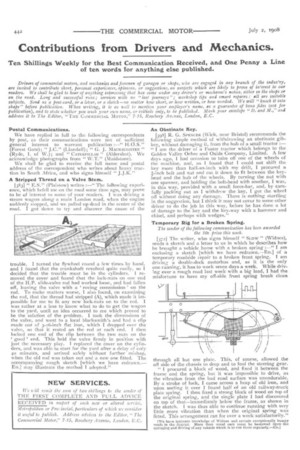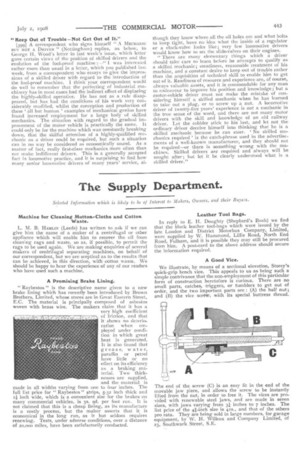Contributions from Drivers and Mechanics.
Page 30

Page 31

If you've noticed an error in this article please click here to report it so we can fix it.
Ten Shillings Weekly for the Best Communication Received, and One Penny a Line of ten words for anything else published.
Drivers of commercial motors, and mechanics and foremen of garages or shops, who are engaged in any branch of the industry, are invited to contribute short, personal experiences, opinions, or suggestions, on suojects which are likely to prove of inlerest to our readers. We shall be glad to hear of anything interesting that has come under any driver's or mechanic's notice, either in the shops or on the road. Long and successful rims ; services with no "lost journeys " ; workshop tips and smart repairs : all are suitable subjects. Send us a posi.card, or a letter, or a sketch—no matter hoze) short, or how written, or how worded. We will "knock it into shape" before publication. When writing, it is as well to mention your employer's name, as a guarantee of bona fides (not for publication), and to state whether you wish your own name, Or initials only, to be publish,d. Mark your envelope "D. and M.," and address it to The Editor, "THE CuMNIERCIAL MOTOR," 7-15, Rosebery Avrnue, London, E.C.
Postal Communications.
We have replied in full to the following correspondents by post, as their communications were not of sufficient general interest to warrant publication :—" H.O.S." (Forest Gate); " J.C." (Llandaff); " G. J. MACNAUGLITEN " (Ryde, I. of W.); and " CATERPILLAR " (Aldershot). We acknowledge photographs from " W.T." (Maidstone).
We shall be glad to receive the full name and postal address of the correspondent who writes about heavy traction in South Africa, and who signs himself " A Stripped Thread on a Valve Stem.
[3831" ES.' (Plaistow) writes :—" The following experience, which befell Inc on the road some time ago, may prove to be of interest to some of your readers. I was driving a steam wagon along a main T.ondon road, when the engine suddenly stopped, and we pulled up dead in the centre of the road. I got down to try and discover the cause of the trouble. I turned the flywheel round a few times by hand, and I found that the crankshaft revolved quite easily, so decided that the trouble must be in the cylinders. I removed the cover and found that the lock-nuts on one end of the H.P. slide-valve rod had worked loose, and had fallen off, leaving the valve with a roving commission ' on the rod. To make matters worse, 1 also found, on examining the rod, that the thread had stripped (A), which made it impossible for me to fit any new lock-nuts on to the rod. I was rather at a loss to know what to do to get the wagon to the yard, until an idea occurred to me which proved to be the solution of the problem. I took the dimensions of the valve, and went to a local blacksmith's and had a clip made out of 3-16-inch flat iron, which I dropped over the valve, so that it rested on the rod at each end. I then locked one end of the clip between the two nuts on the
good ' end. This held the valve firmly in position with just the necessary play. I replaced the cover on the cylinders, arid was able to start for the yard after a delay of only 40 minutes, and arrived safely without further mishap, when the old rod was taken out and a new one fitted. The accompanying rough sketch [which we have redrawn.— Eo.] clay illustrate the method I adopted." An Obstinate Key.
[3981 R. G. SPENCER (Wick, near Bristol) recommends the following simple method of withdrawing an obstinate gibkey, without damaging it, from the hub of a small tractor :— " I am the driver of a Foster tractor which belongs to the Golden Valley Ochre and Oxide Company, Limited. A few. days ago, I had occasion to take oft one of the wheels of the machine, and, as I found that I could not shift the key more than half-an-inch with my drift, I procured a 1-inch bolt and nut and cut it down to fit between the keyhead and the hub of the wheels. By turning the nut with one spanner, and holding the bolt-head with another, I was, in this way, provided with a small force-bar, and, by carefully packing out as I withdrew the key, I got the wheel off without doing any damage. There is nothing startling in the suggestion, but I think it may not occur to some other driver to do the job in this way, before he has done a lot of damage to the key and the key-way with a hammer and chisel, and perhaps with wedges."
Temporary Rig for a Broken Spring.
The sender of the following communication has been awarded the lOs prize this week.
[3721 The writer, who signs himself " Slow " (Widnes), sends a sketch and a letter to us in which he describes how he brought a vehicle home with a broken spring :—" I am enclosing a sketch [which we have redrawn.—En.] of a temporary roadside repair to a broken front spring. I am driving a double-deck motorbus and, as it is the only one running, it has to work seven days a week. While driving over a rough road last week with a big load, I had the misfortune to have my off-side front spring break clean
through all but one plate. This, of course, allowed the off side of the chassis to drop and to foul the steering gear.
" I procured a block of wood, and fixed it between the frame and the spring, but it was impossible to drive, as the vibration from the bad road surface was unendurable. By a stroke of luck, I came across a heap of old iron, and upon sorting it over I found half of an old railway-truck plate spring. I then fixed a strong block of wood on top of the original spring, and the single plate I had discovered on top of that—immediately below the frame, as shown in the sketch. I was thus able to continue running with very little more vibration than when the original spring was fitted. This arrangement ran for over a week satisfactorily."
[We have intimate knowledge of Widnes and certain exceptionally bumpy roads in the district. More than usual care mast be bestowed upon the springing and driving of any vehicle which is to run there regularly.—End
"Keep Out of Trouble—Not Get Out of It."
1,399] A correspondent who signs himself " A MECHANIC BUT NOT A DRIVER " (Nottingham) replies, as below, to George H. Wood's letter in last week's issue, which letter gave certain views of the position of skilled drivers and the evolution of the fool-proof machine :—" I was interested rather more than usual in a letter, which you published last week, from a correspondent who essays to give the impressions of a skilled driver with regard to the introduction of the fool-proof machine. I think your correspondent would do well to remember that the perfecting of industrial machinery has in most cases had the indirect effect of displacing the highly-skilled operative. He has not as a rule disappeared, but has had the conditions of his work very considerably modified; whilst the conception and production of these all but human ' examples of mechanical genius have found increased employment for a large body of skilled mechanics. The situation with regard to the gradual improvement of the motor vehicle is practically the same. It could only be for the machine which was constantly breaking down, that the skilful attention of a highly-qualified mechanic as a driver could be required, but such a situation can in no way be considered as economically sound. As a matter of fact, really first-class mechanics more often than not make indifferent drivers. This is a generally accepted fact in locomotive practice, and it is surprising to find how many senior locomotive drivers of many years' service, al
though they know where all the oil holes are and what bolts. to keep tight, have no idea what the inside of a regulator or a clack-valve looks like ; very few locomotive drivers would know how to set the slide-valves on their engines.
" There are many elementary things which a driver should take care to learn before he attempts to qualify as a skilled mechanic; steadiness, reasonable treatment of his machine, and a constant desire to keep out of trouble rather than the acquisition of technical skill to enable him to get out of it. Readiness of resource and experience are, of course, always valuable assets, and it is commendable for any man to endeavour to improve his position and knowledge ; but a motor-vehicle driver must not make the mistake of considering himself a skilled mechanic when he has learned to take out a plug, or to screw up a nut. A locomotive driver of twenty-five years' experience is not a mechanic in the true sense of the word, and there are not many motor drivers with the skill and knowledge of an old railway driver. Let the cobbler stick to his last, and let not the ordinary driver deceive himself into thinking that he is a
skilled mechanic because he can steer. No skilled mechanics required ' is the catch-phrase used in the advertisements of a well-known manufacturer, and they should not be required—or there is something wrong with the machines. Skilled drivers are required and always will be sought after; but let it be clearly understood what is a skilled driver."
































